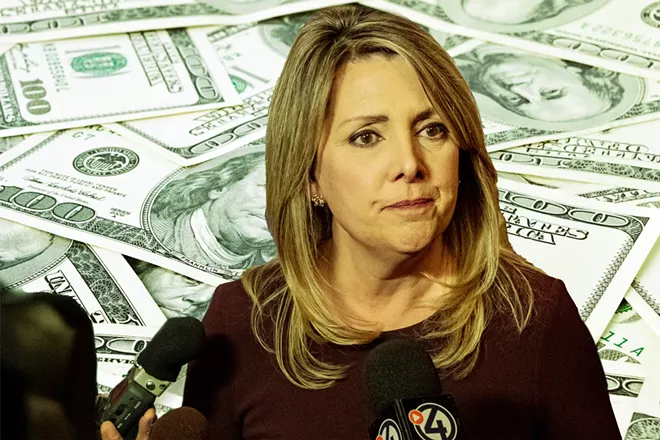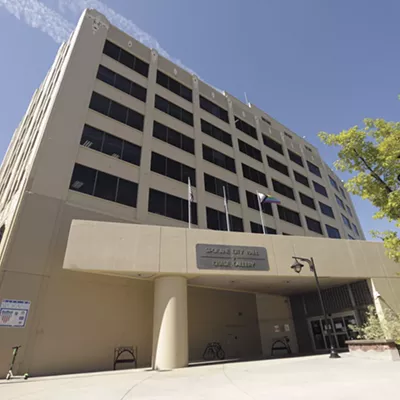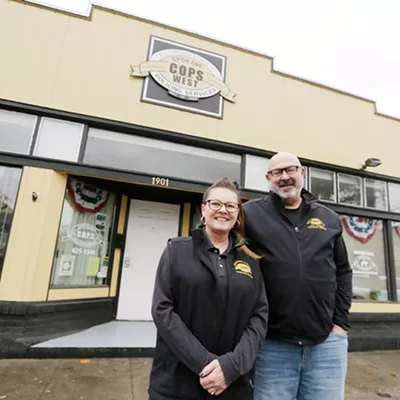There are a million stories in a city budget.
But in this attention-deficit culture, you start droning on about numbers long enough and everyone's eyes glaze over. So instead of just writing one long meandering budget narrative, we here at the Inlander decided to tell a ton of little budget stories in a bite-size, easily digestible, not at all boring chunks.
On your marks, get set, go:
COUNCIL WANTS A STINGIER BUDGET
Last week, the office of Spokane Mayor Nadine Woodward issued a kind of mission-accomplished press release, declaring "Woodward submits balanced priority-based budget."
Ehhhh, not really, City Council members countered.
To them, the mayor's budget isn't really balanced for the long term. Start with the fact that it uses about $2.6 million from reserves — effectively dipping into the city's savings account — to stay afloat.
"I'm really concerned that our unappropriated reserves are so low," says City Council member Lori Kinnear, using fancy talk for the city's unspent savings. "It's like a piggy bank that the administration keeps going into."
Next, add on the fact that the mayor's budget doesn't account for the roughly $5 million the city needs to spend on hardware for the fire department, like fire trucks. Then add the $7 million for operating the city's new homeless shelter. Woodward's budget appears to plan to pay for that using money from a council-opposed sales tax that had been reserved for permanent housing. The council has vehemently objected.
Grab your adding machine and start crunching totals. Matt Boston, the City Council's budget guru, sees more like a $15 million gulf separating what the city takes in as revenue and what he anticipates the Woodward administration will actually spend next year.
But Tonya Wallace, Woodward's chief financial officer, says that improving the city's long-term budget situation should be part of a lengthier process.
"We have lost $37 million in revenue" due to the pandemic, Wallace stressed during a meeting with council members last Thursday.
She argued the reserve funds used were within the "margin of error" and called upon the council to work with the mayor's office to "get back to basics" over the next few months and develop a strategy to weather a potential recession together.
But council members have demanded more specificity, requesting the mayor cut budget costs by 10 percent and start socking away savings for the long metaphorical fiscal winter ahead.
"We are stingy beyond belief with taxpayer dollars," Kinnear says, proudly.
UNPAID UTILITY BILLS
What about all that extra COVID relief money? Could that rescue us in these uncertain economic times? Well, there's only about $13.5 million left. There's also $8.5 million in unpaid utility bills that citizens racked up during the pandemic.
Marlene Feist, the city's public works director, is requesting $5 million of American Rescue Plan Act dollars to try to "see how we can help the most people" by relieving their utility bills.
The City Council sounds willing.
"Can you imagine if you owed $2,000 in utilities?" Kinnear says. "How you'd just feel desperate, like 'I can't ever pay that back?' It's imperative we take that burden off of people."
You know who else got away without fully paying for utilities? Spokane County.
Ever since the county's new wastewater treatment center began operating inside city limits in December 2011, the city was supposed to be collecting taxes from the county, but decided, nah, they wouldn't enforce it.
This little nugget of information was part of a report released last month by the state auditor, which found that the city had foregone millions in revenue by not following their own tax laws.
If the city had collected those taxes, the state auditor found, it'd have reaped $5 million from 2017 to 2020. In the city's response to the audit, it promised the state it would work out a deal with the county on that issue, as part of sprawling discussions over everything from criminal justice to homelessness, by the end of January.
Surely, considering history and all, things will work out, right?
ABOUT THAT OVERTIME STUDY...
The council expects to spend the rest of COVID relief funds to pay for yet another big round of budget overruns: $3.7 million for fire overtime and $2.5 million in police overtime.
Cue the déjà vu.
"Every year, both police and fire blow through their overtime budget," Kinnear says, comparing it to Peanuts character Lucy yanking the football away from Charlie Brown. "They keep fooling us and we keep falling for it."
Last year, the City Council was frustrated that — despite record levels of police and fire overtime usage — a study on the topic they'd funded in the 2020 budget hadn't been done.
This year, there are still huge overtime overruns, and we still don't have that overtime study, despite farming it out to Matrix Consulting a year ago. Back then, the city thought it would take a year to conduct a study. And Matrix, still fresh-faced ingenues full of hope and idealism, thought they'd be able to crank it out in just 24 weeks. That, uh, didn't happen.
In August, there was even an indication that Matrix was having trouble getting info from the city at all.
"Hey do you mind just doing something odd for me," Matrix's Greg Mathews wrote in an email to the City Council's budget guru in August. "Can you respond to this email please just so I know that my emails to the city of Spokane are still working?"
In a phone conversation with the Inlander, Mathews acknowledged that there were some communications challenges with the city but said the much, much bigger problem was the city's terrible budgeting software.
"Their information technology systems are, frankly, quite antiquated," Mathews says. And that turned "getting data that is usable and comprehensive" into a Herculean task.
When just finding out what's been happening with overtime is a nightmare, it makes it a lot harder to fix it.
While Matrix offered a confidential preview of their initial findings in September to the city, they won't have the final study until Dec. 1. They say.
...OR THE FIRE SICK-LEAVE AUDIT
A year ago, Woodward also declared that she was kicking off a third-party "forensic audit" to dig into how the fire department uses its sick leave.
After all, sick leave use had spiked dramatically in the months leading up to the COVID vaccine mandate deadline for city firefighters. The mayor leapt into the fray, declaring she was taking "immediate action" to probe the issue and gain the kind of insights that could impact "labor contract negotiations, budgeting, and spending."
"The audit is expected to take several weeks to complete once initiated," the November 2021 news release predicted.
Well, like the overtime study, the sick leave audit still isn't finished. While the mayor’s spokesman initially told Inlander a third-party firm, Preston CPA, wasn’t hired to conduct the audit until May, public records show that the contract was signed back in January. Results are expected soon.
Randy Marler, president of the Spokane Firefighters Union, says he hasn't heard anything about the audit, but he shrugs off any speculation about fire department shenanigans.
"It's pretty obvious what's happened over the last couple years," Marler says. His theory: Firefighters started using more sick leave because they or their family members — wait for it — got sick.
HUMAN-LESS RESOURCES
But even as some council members have been pushing for cuts and hiring freezes, there's a problem: Spokane is already bleeding employees.
For all the concern over unfilled positions at the city in 2021, the problem's gotten worse in 2022. Even though the number of vacancies isn't as bad as it was earlier this year, this October's 258 vacancies exceeded even the worst month of 2021. And the mayor wants to add an additional 51 new positions next year.
In addition to that, the city has seen even more retirements and resignations. From January through September, there were one and a half times more resignations this year than last (that doesn't include temporary or seasonal employees).
We're talking about City Hall department heads: Engineering Services Director Kyle Twohig; Development Services Director Kris Becker; Neighborhood, Housing and Human Services Director John Hall; and Neighborhood Services Director Carly Cortright all left the city this year.
Brandy Cote, who had been Woodward's chief of staff, had her position straight-up eliminated in August.
And if this sounds like maybe something the Human Resources department could fix, well, we've got bad news there too. The four HR staffers who've resigned this year include Director Kris Smith and the former interim director, Meghann Steinolfson. They had to borrow an attorney from the city's legal department just to have someone in charge.
"It's problematic that we don't have an HR director," Kinnear says.
Yet the city's attempt to keep its employees has its own problems. With inflation so high, the city agreed to give big yearly salary increases to unionized employees. But that's one reason we're in such a big budget mess in the first place.
TAX ON SHELTERS
Hold on a minute, you might be saying, audibly speaking to the newspaper in your hand. Why is inflation even an issue? Sure, costs go up, but that just means tax revenue goes up just as fast, right? Because of, like, percentages?
You would think that. But you'd be wrong. Sure, sales tax revenue skyrockets, but that's not the case with property taxes, a major source of revenue for the city. Property taxes can only go up by a max of 1 percent a year, no matter how fast the value of homes increase. That led to the value of Spokane properties growing about five times faster in 2021 than the city's property tax revenues did.
Still, one council member, Michael Cathcart, argues that not only should the city cut spending a bunch, it shouldn't even take that 1 percent increase.
"The government is very responsible for a whole lot of things that people are suffering right now," Cathcart says. "We should just not add to the suffering."
But please, spare a moment also for the suffering city accountants and their 10-key calculators, trying to make the budget balance. ♦
This story has been updated to correctly reflect when Preston CPA was hired to conduct the city’s sick-leave audit.

























